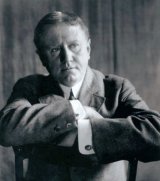Lucky Either Way
"Lucky Either Way" by O. Henry is a short story that explores themes of chance and the unpredictability of fortune. The narrative centers around two characters who find themselves at a crossroads, faced with decisions that can dramatically alter their lives. O. Henry's signature style is evident through his clever use of irony and witty dialogue, culminating in a twist that reveals the true nature of luck and the ways we often misinterpret our circumstances. The story captures the essence of human emotion and the serendipitous moments that define our destinies.
The Memphis Commercial-Appeal, in commenting on errors in grammar made by magazines, takes exception to an error in construction occurring in Gode's Magazine in which, in J. H. Connelly's story entitled "Mr. Pettigrew's Bad Dog," a character is made to say: "You will be lucky if you escape with only marrying one." A man says this to another one who is being besieged by two ladies, and the Commercial-Appeal thinks he intended to say: "You will be lucky if you escape with marrying only one." Now, after considering the question, it seems likely that there is more in Mr. J. H. Connelly's remark than is dreamed of in the philosophy of the Commercial-Appeal. The history of matrimony gives color to the belief that, to whichever one of the ladies the gentleman might unite himself, he would be lucky if he escaped with only marrying her. Getting married is the easiest part of the affair. It is what comes afterward that makes a man sometimes wish a wolf had carried him into the forest when he was a little boy. It takes only a little nerve, a black coat, from five to ten dollars, and a girl, for a man to get married. Very few men are lucky enough to escape with only marrying a woman. Women are sometimes so capricious and unreasonable that they demand that a man stay around afterward, and board and clothe them, and build fires, and chop wood, and rock the chickens out of the garden, and tell the dressmaker when to send in her bill again. We would like to read "Mr. Pettigrew's Bad Dog" and find out whether the man was lucky enough to only marry the lady, or whether she held on to him afterward and didn't let him escape.
Translation
Translate and read this book in other languages:
Select another language:
- - Select -
- 简体中文 (Chinese - Simplified)
- 繁體中文 (Chinese - Traditional)
- Español (Spanish)
- Esperanto (Esperanto)
- 日本語 (Japanese)
- Português (Portuguese)
- Deutsch (German)
- العربية (Arabic)
- Français (French)
- Русский (Russian)
- ಕನ್ನಡ (Kannada)
- 한국어 (Korean)
- עברית (Hebrew)
- Gaeilge (Irish)
- Українська (Ukrainian)
- اردو (Urdu)
- Magyar (Hungarian)
- मानक हिन्दी (Hindi)
- Indonesia (Indonesian)
- Italiano (Italian)
- தமிழ் (Tamil)
- Türkçe (Turkish)
- తెలుగు (Telugu)
- ภาษาไทย (Thai)
- Tiếng Việt (Vietnamese)
- Čeština (Czech)
- Polski (Polish)
- Bahasa Indonesia (Indonesian)
- Românește (Romanian)
- Nederlands (Dutch)
- Ελληνικά (Greek)
- Latinum (Latin)
- Svenska (Swedish)
- Dansk (Danish)
- Suomi (Finnish)
- فارسی (Persian)
- ייִדיש (Yiddish)
- հայերեն (Armenian)
- Norsk (Norwegian)
- English (English)
Citation
Use the citation below to add this book to your bibliography:
Style:MLAChicagoAPA
"Lucky Either Way Books." Literature.com. STANDS4 LLC, 2025. Web. 26 Feb. 2025. <https://www.literature.com/book/lucky_either_way_5627>.








Discuss this Lucky Either Way book with the community:
Report Comment
We're doing our best to make sure our content is useful, accurate and safe.
If by any chance you spot an inappropriate comment while navigating through our website please use this form to let us know, and we'll take care of it shortly.
Attachment
You need to be logged in to favorite.
Log In